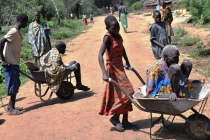MOST working Ugandans are only educated up to secondary level, work for 10 years, six days a week and earn at least shillings 403/- per hour according to a wages survey.
In the wage indicator survey, released recently, 1,306 Ugandans from all administrative regions were interviewed by the Federation of Uganda Employers (FUE) in conjunction with Dutch and Tanzanian researchers.
Conservative estimates place Uganda’s working population at 17 million. The average working week of respondents is almost 60 hours and they work six days per week.
Slightly over half (51%) work evenings, seven of 10 workers report working on Saturdays, while four of 10 work on Sundays.
Nearly half of the workers in the sample were managers. Only two of 10 workers had a permanent contract, three of 10 were on fixed term contract while four of 10 workers said they are entitled to social security.
Despite the low numbers entitled to pensions, respondents indicated having four dependants on average. The analysis showed that 77% of the workers were paid on or above the poverty line of sh403 per hour or $1.25 (about sh3,000) per day.
Five percent of workers had no formal education, 14% studied to primary education 48% had secondary education certificates, 16% had a college education and 17% a university degree. Only 62% of informal workers are paid above the poverty line compared to 97% of the most formal workers.
Workers in trade, transport and hospitality are most at risk of poverty with 30% paid less than a dollar a day. Public servants are best paid. At least 92% earned above the poverty line.
Labour State minister Rukutana Mwesigwa recently revealed that Cabinet is considering creation of a wage board and a minimum wage.
The Government last set a minimum wage of sh6,000 in 1984. In 1975, the Minimum Wage Advisory Council recommended a sh75,000 minimum monthly wage. It remains on paper.
The Senior Citizens Grant in Uganda is given to the elderly aged 65 and above to help them live decent livelihoods; however, in some districts, it is the young, energetic poor that are being given the money.
SCG is aimed at enhancing access to basic needs such as food security, better nutrition, health care and improving housing among others which is legal onus of the state to provide wellbeing and upkeep for the elderly.
David Lambert Tumwesigye, advocacy advisor at Expanding Social Protection (ESP) at the Ministry Gender, Labour and Social Development (MGLSD) calls upon the new MPs to join the Uganda Parliamentary Forum on Social Protection (UPFSP) so that they can advocate care for the elderly.
What do MPs say?
Agnes Taka, Bugiri Woman MP, appreciates the services that have been offered to the elderly through SAGE. However, she calls upon the government to be open and involve grassroots leaders when selecting beneficiaries saying it will help to avoid issues of segregation.
“We need to know what criterion is followed when choosing SAGE beneficiaries. It is perturbing to learn about activities being done in your constituency from locals. Leaders need to be involved,” argues Taka.
She wonders why majority of the 15 districts where SAGE has been enrolled and the next 20 districts targeted to benefit from the programme are not from poverty stricken areas.
She asks her colleagues to push the government hard so that there can be transparency in the enrollment.
Rtd Lt Cyrus Amodoi, MP Tonoma County, Katakwi district, marvels at why the programme in some districts has been shifted from the elderly to the poorest people.
“What I have seen is that there is political interference in some parts where SAGE has been enrolled. In some places they target the poorest people instead of senior citizens,” says Amodoi.
In response to MPs queries, Drake Rukundo, Policy and Monitoring and Evaluation, UPFSP, says they have on ground people who gather information for the befitting citizens. He encourages the MPs to advocate countrywide enrollment for the elderly.
Rukundo says they want government to commit resources as a priority towards social protection to help the elderly live decent livelihoods because they are the bridge between the past and the future.
He applauds the 9th Parliament for being instrumental in ensuring the survival of the SAGE programme and extending it from 15 districts to additional 40 districts in the next five years.
In the FY 2015/16 Budget process, Parliament made a resolution where the SAGE programme was to be rolled out to the whole country covering 100 oldest persons in every sub-county.
Tumwesigye says the 10th parliament and the government did their work and it remains critical that all districts get covered for fairness and equitable development. The new MPs are expected to enlist to become members so that advocacy on social protection is boosted.
The forum undertakes to provide information and create spaces for engagement on issues touching social protection.
The cabinet passed the social protection policy which proposes a myriad of progressive interventions that if implemented will significantly contribute to the journey from third world to middle income status as envisaged in the Vision 2040.
However, even with the current roll-out plan, only a total of 55 districts will be reached leaving out 57 districts. To maximise pressure on government, the Forum has conducted regional consultative meetings that bring together Members of Parliament, District Chairpersons, District Community Development Officers and the civil society.
Reports from the Ministry
Reports from the Ministry of Gender, Labour and Social Development indicate that the senior citizens grant is increasing productive investment where 32 per cent of the beneficiaries use the money to buy livestock or engage in petty trading while 27 per cent of the beneficiaries invest their money in hiring additional labour to work in their gardens.
“At least 16 per cent of the beneficiaries save their month’s payment purposely to cover emergencies, 17 per cent use the gratuities to support productive investments, cultivation (15 per cent and meeting the educational needs of children and/or grandchildren taking 14 per cent,” reads the report on expanding social protection programme for senior citizens grant.
According to the report, majority of the senior citizens grant beneficiaries spend the large part of their transfers on food leading to increased frequency, quantity and quality of meals eaten by beneficiary households.
The report further shows that SCG beneficiaries especially women consistently report improved participation in community affairs, sense of self-esteem and empowerment. Older people report feeling less discriminated against in their communities and more valued by their families on account of their ability to make social contributions to community-based social support mechanisms which are based on reciprocity like contributing to funerals and weddings.
About SAGE
SAGE is a financial support programme for people aged 65 years and above. Currently, the programme is covering 15 districts. A total of 40 more districts have been lined up to benefit from SAGE by 2020.
In the 2015/16 budget, over Shs30b was expected for the national rollout where 100 persons per sub-county were to benefit but government committed Shs9 billion only.












